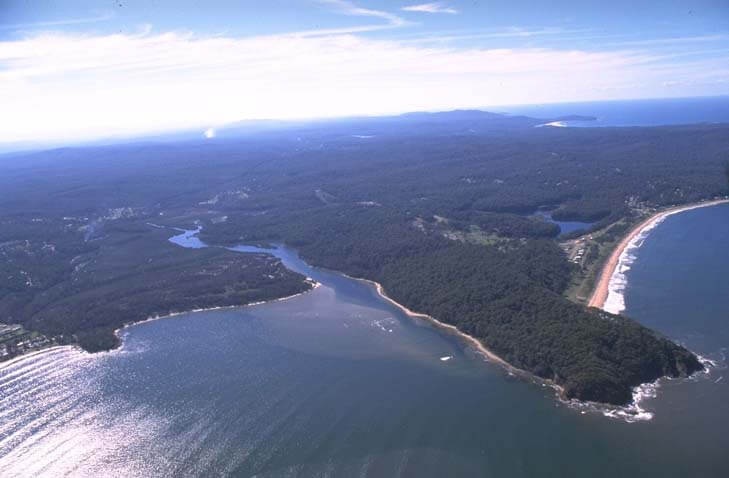Cullendulla Creek is located on the south coast of New South Wales between Durras and Batemans Bay. It is a wave-dominated barrier river estuary with an intermittently open entrance.
The estuary hosts substantial mangrove communities and tidal sand flats, as well as a boardwalk that offers great birdwatching opportunities.
Water quality report card
As part of our water quality monitoring program we assess the water quality and ecosystem health of an estuary using a range of relevant indicators. We sample a subset of the estuaries between Wollongong and the Victorian border every 3 years. The most recent sampling in Cullendulla Creek was completed over the 2017–18 summer, when 2 sites were sampled on a monthly basis.
This report card represents 2 water quality indicators that we routinely measure: the amount of algae present and water clarity. Low levels of these 2 indicators equate with good water quality.
Algae
Water clarity
Overall grade
The report card shows the condition of the estuary was good with:
- algae abundance graded good (B)
- water clarity graded good (B)
- overall estuary health graded good (B).
Grades for algae, water clarity and overall are represented as:
- A – excellent
- B – good
- C – fair
- D – poor
- E – very poor.
Go to estuary report cards to find out what each grade means, read our sampling, data analysis and reporting protocols, and find out how we calculate these grades.
Physical characteristics
| Estuary type | Barrier river |
|---|---|
| Latitude | –35.7 (ºS) |
| Longitude | 150.21 (ºE) |
| Catchment area | 15.2 km2 |
| Estuary area | 1.3 km2 |
| Estuary volume | 986.1 ML |
| Average depth | 0.9 m |
Notes: km2 = square kilometres; m = metres; ML = megalitres.
Water depth and survey data
Bathymetric and coastal topography data for this estuary are available in our data portal.
Land use
The catchment of Cullendulla Creek is moderately disturbed, with one-third of the land used in urban areas of North Batemans Bay. Over half of the catchment is forest, some of which lies in Murramarang National Park.
National and marine parks
- Murramarang National Park is the largest conservation area within this catchment. The lower estuary flows through Cullendulla Creek Nature Reserve, located at the mouth of the estuary where it enters Batemans Bay.
- This estuary flows into Batemans Marine Park.
Citizen science projects
- iNaturalist’s Plants of Eurobodalla is a citizen science project that monitors plants found in the Eurobodalla region.
- The South Coast Shorebird Recovery Program provides the opportunity for people to get involved in the protection and recovery of shore birds.
- The Budawang Coast Nature Map is an online data platform the community can use to record and identify biodiversity. Data collected is used to map the distribution of native plant and animal species from Moruya up almost to Kiama.
Community involvement
- Eurobodalla Landcare is a volunteer network of 24 Landcare groups on the NSW south coast.
- The Coastwatchers Association is a community environmental and conservation group based on the south coast.

Aerial view of Cullendulla Creek
Local government management
Local councils manage estuaries within their area unless the estuary is attached to a marine park.
Eurobodalla Shire Council manages this estuary. This estuary flows into Batemans Marine Park.
Threatened species
Cullendulla Creek Nature Reserve contains a small area of swamp oak floodplain forest, an endangered ecological community.
Threatened species that live in the Cullendulla Creek catchment area include sugar gliders and oyster catchers.
Read more about the biodiversity in our estuaries.